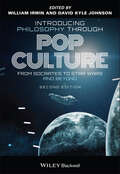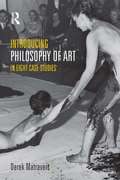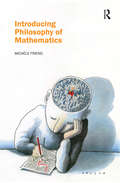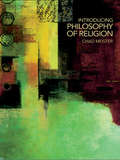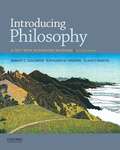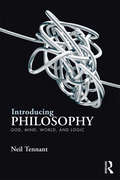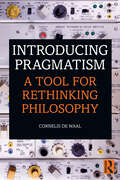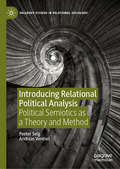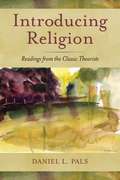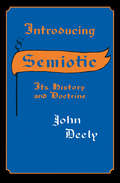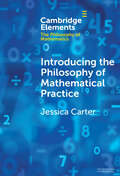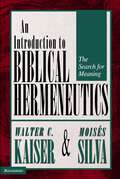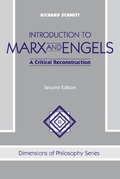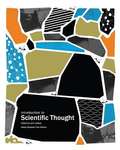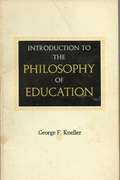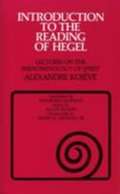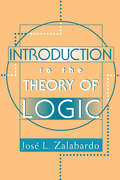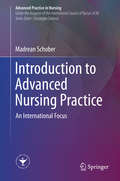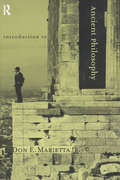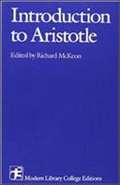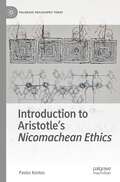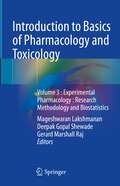- Table View
- List View
Introducing Philosophy Through Pop Culture: From Socrates to Star Wars and Beyond
by William Irwin David Kyle JohnsonCan Wonder Woman help us understand feminist philosophy? How Does Wakandan technology transcend anti-Blackness? What can Star Trek teach us about the true nature of reality? Introducing Philosophy Through Pop Culture makes important philosophical concepts and the work of major philosophers relevant, fun, and exciting. Using engaging examples from film and television, this easy-to-read book covers everything from basic metaphysics and epistemology to abstract and complex philosophical ideas about ethics and the meaning of life. You don’t have to be a pop culture expert to benefit from this book—even a general awareness of cultural icons like Superman or Harry Potter will be more than enough for you to learn about a wide range of philosophical notions, thinkers, and movements. The expanded second edition offers timely coverage of important topics such as race, gender, personal identity, social justice, and environmental ethics. New essays explore the philosophical underpinnings of The Good Place, Game of Thrones, Black Panther, Star Wars, The Avengers, South Park, The Lego Movie, The Big Bang Theory, and more. This edition is supported by a new website with links to primary philosophical texts, information about all the popular culture discussed, and additional resources for teachers, students, and general readers alike. Features a selection of key essays from the bestselling Blackwell Philosophy and Pop Culture Series Draws on examples from popular media including The Matrix, Lost, Doctor Strange, The Hobbit, Westworld, and Star Trek Explains philosophical concepts such as relativism, skepticism, existentialist ethics, logic, social contract theory, utilitarianism, and mind-body dualism Discusses the ideas of Socrates, Aristotle, Plato, Descartes, Nietzsche, Heidegger, Marx, Mill, Kierkegaard, and other important thinkers Introducing Philosophy Through Pop Culture is an excellent supplementary textbook for introductory philos for introductory philosophy courses and a valuable resource for general readers wanting to learn about philosophy and its connections with pop culture.
Introducing Philosophy of Art: In Eight Case Studies
by Derek MatraversDerek Matravers introduces students to the philosophy of art through a close examination of eight famous works of twentieth-century art. Each work has been selected in order to best illustrate and illuminate a particular problem in aesthetics. Each artwork forms the basis of a single chapter and readers are introduced to such issues as artistic value, intention, interpretation, and expression through a careful analysis of the artwork. Questions considered include what does art mean in contemporary art practice? Is the artistic value of a painting the same as how much you like it? If a painting isn't of anything, then how do we understand it? Can art be immoral? By grounding abstract and theoretical discussion in real examples the book provides an excellent way into the subject for readers new to the philosophical dimension of art appreciation.
Introducing Philosophy of Mathematics
by Michele FriendWhat is mathematics about? Does the subject-matter of mathematics exist independently of the mind or are they mental constructions? How do we know mathematics? Is mathematical knowledge logical knowledge? And how is mathematics applied to the material world? In this introduction to the philosophy of mathematics, Michele Friend examines these and other ontological and epistemological problems raised by the content and practice of mathematics. Aimed at a readership with limited proficiency in mathematics but with some experience of formal logic it seeks to strike a balance between conceptual accessibility and correct representation of the issues. Friend examines the standard theories of mathematics - Platonism, realism, logicism, formalism, constructivism and structuralism - as well as some less standard theories such as psychologism, fictionalism and Meinongian philosophy of mathematics. In each case Friend explains what characterises the position and where the divisions between them lie, including some of the arguments in favour and against each. This book also explores particular questions that occupy present-day philosophers and mathematicians such as the problem of infinity, mathematical intuition and the relationship, if any, between the philosophy of mathematics and the practice of mathematics. Taking in the canonical ideas of Aristotle, Kant, Frege and Whitehead and Russell as well as the challenging and innovative work of recent philosophers like Benacerraf, Hellman, Maddy and Shapiro, Friend provides a balanced and accessible introduction suitable for upper-level undergraduate courses and the non-specialist.
Introducing Philosophy of Religion
by Chad MeisterDoes God exist? What about evil and suffering? How does faith relate to science? Is there life after death? These questions fascinate everyone and lie at the heart of philosophy of religion. Chad Meister offers an up-to-date introduction to the field, focussing not only on traditional debates but also on contemporary concepts such as the intelligent creator. Key topics, such as divine reality and the self and religious experience, are discussed in relation to different faiths. Introducing Philosophy of Religion: • offers a lucid overview of contemporary philosophy of religion• introduces the key figures in the history of philosophy of religion • explores the impact of religious diversity and pluralism • examines the main arguments for and against the existence of God and the nature of the divine • looks at science and issues of faith and reason • explores how the different religions approach the concept of life after death. The wealth of textbook features, including tables of essential information, questions for reflection, summaries, glossary and recommendations for further reading make the book ideal for student use. Along with its accompanying Reader, this is the perfect introductory package for undergraduate philosophy of religion courses. Visit the book's companion website at www.routledge.com/textbooks/9780415403276. Features include: an interactive glossary a timeline powerpoint slides on all the chapters chapter outlines lists of objectives for study.
Introducing Philosophy: A Text with Integrated Readings
by Clancy Martin Robert C. Solomon Kathleen M. HigginsThe authors combine substantial selections from significant works in the history of philosophy with excerpts from current philosophy, clarifying the readings and providing context with their own detailed commentary and explanation.
Introducing Philosophy: God, Mind, World, and Logic
by Neil TennantWritten for any readers interested in better harnessing philosophy’s real value, this book covers a broad range of fundamental philosophical problems and certain intellectual techniques for addressing those problems. In Introducing Philosophy: God, Mind, World, and Logic, Neil Tennant helps any student in pursuit of a ‘big picture’ to think independently, question received dogma, and analyse problems incisively. It also connects philosophy to other areas of study at the university, enabling all students to employ the concepts and techniques of this millennia-old discipline throughout their college careers – and beyond.? KEY FEATURES AND BENEFITS: -- Investigates the philosophy of various subjects (psychology, language, biology, math), helping students contextualize philosophy and view it as an interdisciplinary pursuit; also helps students with majors outside of philosophy to see the relationship between philosophy and their own focused academic pursuits -- Author comes from a distinguished background in Logic and Philosophy of Language, which gives the book a level of rigor, balance, and analytic focus sometimes missing from primers to philosophy -- Introduces students to various important philosophical distinctions (e.g. fact vs. value, descriptive vs. prescriptive, norms vs. laws of nature, analytic vs. synthetic, inductive vs. deductive, a priori vs. a posteriori) providing skills that are important for undergraduates to develop in order to inform their study at higher levels. They are essential for further work in philosophy but they are also very beneficial for students pursuing most other disciplines -- Is much more methodologically comprehensive than competing introductions, giving the student the ability to address a wide range of philosophical problems – and not just the ones reviewed in the book -- Offers a companion website with links to apt primary sources, organized chapter-by-chapter, making unnecessary a separate Reader/Anthology of primary sources – thus providing students with all reading material necessary for the course -- Provides five to ten discussion questions for each chapter, helping instructors and students better interact with the ideas and concepts in the text
Introducing Pragmatism: A Tool for Rethinking Philosophy
by Cornelis de WaalThis unique introduction fully engages and clearly explains pragmatism, an approach to knowledge and philosophy that rejects outmoded conceptions of objectivity while avoiding relativism and subjectivism. It follows pragmatism’s focus on the process of inquiry rather than on abstract justifications meant to appease the skeptic. According to pragmatists, getting to know the world is a creative human enterprise, wherein we fashion our concepts in terms of how they affect us practically, including in future inquiry. This book fully illuminates that enterprise and the resulting radical rethinking of basic philosophical conceptions like truth, reality, and reason. Author Cornelis de Waal helps the reader recognize, understand, and assess classical and current pragmatist contributions—from Charles S. Peirce to Cornel West—evaluate existing views from a pragmatist angle, formulate pragmatist critiques, and develop a pragmatist viewpoint on a specific issue. The book discusses: Classical pragmatists, including Peirce, James, Dewey, and Addams; Contemporary figures, including Rorty, Putnam, Haack, and West; Connections with other twentieth-century approaches, including phenomenology, critical theory, and logical positivism; Peirce’s pragmatic maxim and its relation to James’s Will to Believe; Applications to philosophy of law, feminism, and issues of race and racism.
Introducing Relational Political Analysis: Political Semiotics as a Theory and Method (Palgrave Studies in Relational Sociology)
by Andreas Ventsel Peeter SelgThis book introduces relational thinking to political analysis. Instead of merely providing an overview of possible trajectories for articulating a relational political analysis, Peeter Selg and Andreas Ventsel put forth a concrete relational theory of the political, which has implications for research methodology, culminating in a concrete method they call political form analysis. In addition, they sketch out several applications of this theory, methodology and method. They call their approach “political semiotics” and argue that it is a fruitful way of conducting research on power, governance and democracy – the core dimensions of the political – in a manner that is envisioned in numerous discussions of the “relational turn” in the social sciences. It is the first monograph that attempts to outline an approach to the political that would be relational throughout, from its meta theoretical and theoretical premises through to its methodological implications, methods and empirical applications.
Introducing Religion: Readings from the Classic Theorists
by Daniel L. PalsIntroducing Religion: Readings from the Classic Theorists presents eleven key texts from influential theorists who played a pivotal role in the modern enterprise of explaining the phenomenon of religion. These writings seek to account for the origin, function, and enduring human appeal of religion by drawing on methods of scientific scholarship unconstrained by theological creeds or confessional commitments. Introducing Religion opens with selections from the works of Edward Burnett Tylor and James Frazer--Victorian pioneers in anthropology and the comparative study of religion. It then offers entry into the provocative analyses of Sigmund Freud, Emile Durkheim, and Karl Marx, whose aggressive reductionist approaches framed the explanatory debate for much of the century to follow. Responses to reductionist theories--and new directions in explanation--claim a place in selections from the works of philosopher-psychologist William James, theologian Rudolf Otto, sociologist Max Weber, and comparativist Mircea Eliade. The volume ends with discussions drawn from the celebrated field studies of British anthropologist E. E. Evans-Pritchard and the interpretive anthropology of American theorist Clifford Geertz, whose fieldwork took him to both Asia and the Middle East. Brief career portraits of the theorists at the outset of each chapter give context to the readings, and a general introduction features guiding questions designed to help students assess and compare the different theories. Offering an illuminating overview of this controversial and engaging subject, the text is ideal for introductory courses in religion as well as courses in method and theory of religion, world religions, and sociology, psychology, or anthropology of religion.
Introducing Semiotic: Its History and Doctrine (Advances In Semiotics Ser. #No. 287)
by John DeelyThis comprehensive survey of semiotics examines its development from pre-Socratic philosophy to Peirce’s Sign Theory and beyond.In Introducing Semiotics, renowned philosopher and semiotician John Deely provides a conceptual overview of the field, covering its development across centuries of Western philosophical thought. It delineates the foundations of contemporary semiotics and concretely reveals just how integral and fundamental the semiotic point of view really is to Western culture. In particular, the book bridges the gap from St. Augustine in the fifth century to John Locke in the seventeenth.The appeal of semiotics lies in its apparent ability to establish a common framework for all disciplines, a framework rooted in the understanding of the sign as the universal means of communication. With its clarity of exposition and careful use of primary sources, Introducing Semiotics is an essential text for newcomers to the subject and an ideal textbook for semiotics courses.
Introducing the Philosophy of Mathematical Practice (Elements in the Philosophy of Mathematics)
by Jessica CarterThis Element introduces a young field, the 'philosophy of mathematical practice'. We first offer a general characterisation of the approach to the philosophy of mathematics that takes mathematical practice seriously and contrast it with 'mathematical philosophy'. The latter is traced back to Bertrand Russell and the orientation referred to as 'scientific philosophy' that was active between 1850 and 1930. To give a better sense of the field, the Element further contains two examples of topics studied, that of mathematical structuralism and visual thinking in mathematics. These are in part presented from a methodological point of view, focussing on mathematics as an activity and questions related to how mathematics develops. In addition, the Element contains several examples from mathematics, both historical and contemporary , to illustrate and support the philosophical points.
Introduction To Biblical Hermeneutics: The Search for Meaning
by Walter KaiserThis standard hermeneutics text has been updated and expanded, allowing the authors to fine-tune their discussions on fundamental interpretive topics. Four new chapters have been added that address more recent controversial issues. The coauthors hold different viewpoints on many topics addressed, making for vibrant, thought-provoking dialogue on this crucial discipline.
Introduction To Marx And Engels
by Richard SchmittThis book steers a middle path between those who argue that the theories of Marx and Engels have been rendered obsolete by historical events and those who reply that these theories emerge untouched from the political changes of the last ten years. Marxism has been a theory of historical change that claimed to be able to predict with considerable accuracy how existing institutions were going to change. Marxism has also been a political program designed to show how these inevitable changes could be hastened. Richard Schmitt argues that Marxian predictions are ambiguous and unreliable, adding that the political program is vitiated by serious ambiguities in the conceptions of class and of political and social transformations. Marxism remains of importance, however, because it is the major source of criticisms of capitalism and its associated social and political institutions. We must understand such criticisms if we are to understand our own world and live in it effectively. While very critical of the failures of Marx and Engels, this book offers a sympathetic account of their criticism of capitalism and their visions of a better world, mentions some interpretive controversies, and connects the questions raised by Marx and Engels to contemporary disputes to show continuity between social thought in the middle of the last century and today. Addressed to undergraduate students, the book is easily accessible. It will be important in introductory or middle-level courses in sociology, political theory, critical theory of literature or law. It will also be useful in graduate courses in political theory, sociology, and economics.
Introduction To Marx And Engels
by Richard SchmittThis book steers a middle path between those who argue that the theories of Marx and Engels have been rendered obsolete by historical events and those who reply that these theories emerge untouched from the political changes of the last ten years.Marxism has been a theory of historical change that claimed to be able to predict with considerable accuracy how existing institutions were going to change. Marxism has also been a political program designed to show how these inevitable changes could be hastened. Richard Schmitt argues that Marxian predictions are ambiguous and unreliable, adding that the political program is vitiated by serious ambiguities in the conceptions of class and of political and social transformations. Marxism remains of importance, however, because it is the major source of criticisms of capitalism and its associated social and political institutions. We must understand such criticisms if we are to understand our own world and live in it effectively. While very critical of the failures of Marx and Engels, this book offers a sympathetic account of their criticism of capitalism and their visions of a better world, mentions some interpretive controversies, and connects the questions raised by Marx and Engels to contemporary disputes to show continuity between social thought in the middle of the last century and today.Addressed to undergraduate students, the book is easily accessible. It will be important in introductory or middle-level courses in sociology, political theory, critical theory of literature or law. It will also be useful in graduate courses in political theory, sociology, and economics.
Introduction To Marx And Engels
by Richard SchmittThis book steers a middle path between those who argue that the theories of Marx and Engels have been rendered obsolete by historical events and those who reply that these theories emerge untouched from the political changes of the last ten years. Marxism has been a theory of historical change that claimed to be able to predict with considerable accuracy how existing institutions were going to change. Marxism has also been a political program designed to show how these inevitable changes could be hastened. Richard Schmitt argues that Marxian predictions are ambiguous and unreliable, adding that the political program is vitiated by serious ambiguities in the conceptions of class and of political and social transformations. Marxism remains of importance, however, because it is the major source of criticisms of capitalism and its associated social and political institutions. We must understand such criticisms if we are to understand our own world and live in it effectively. While very critical of the failures of Marx and Engels, this book offers a sympathetic account of their criticism of capitalism and their visions of a better world, mentions some interpretive controversies, and connects the questions raised by Marx and Engels to contemporary disputes to show continuity between social thought in the middle of the last century and today. Addressed to undergraduate students, the book is easily accessible. It will be important in introductory or middle-level courses in sociology, political theory, critical theory of literature or law. It will also be useful in graduate courses in political theory, sociology, and economics.
Introduction To Marx And Engels
by Richard SchmittThis book steers a middle path between those who argue that the theories of Marx and Engels have been rendered obsolete by historical events and those who reply that these theories emerge untouched from the political changes of the last ten years.Marxism has been a theory of historical change that claimed to be able to predict with considerable accuracy how existing institutions were going to change. Marxism has also been a political program designed to show how these inevitable changes could be hastened. Richard Schmitt argues that Marxian predictions are ambiguous and unreliable, adding that the political program is vitiated by serious ambiguities in the conceptions of class and of political and social transformations. Marxism remains of importance, however, because it is the major source of criticisms of capitalism and its associated social and political institutions. We must understand such criticisms if we are to understand our own world and live in it effectively. While very critical of the failures of Marx and Engels, this book offers a sympathetic account of their criticism of capitalism and their visions of a better world, mentions some interpretive controversies, and connects the questions raised by Marx and Engels to contemporary disputes to show continuity between social thought in the middle of the last century and today.Addressed to undergraduate students, the book is easily accessible. It will be important in introductory or middle-level courses in sociology, political theory, critical theory of literature or law. It will also be useful in graduate courses in political theory, sociology, and economics.
Introduction To Scientific Thought
by John OakesThis textbook is intended for use in a course on scientific thought. It includes a mixture of classic readings from the great figures in science and in the philosophy of science, as well as practical essays on scientific methodology, ethics and pseudoscience. Students will be introduced to the scientific world view: its sphere and limitations. <p><p> The book develops the methodology, epistemology, history and philosophy of science. It will give the student tools to reflect on the ethical implications of scientific discovery. In addition, the student will be trained in skepticism and critical thinking in order to distinguish pseudoscience from real science. The distinction between scientific and religious thought will be considered, as well as a discussion of the questions of interest to both.
Introduction To The Philosophy Of Education
by E. KnellerThe purpose of this book is to outline those elements of philosophy that are relevant to a proper understanding of education and the task of teaching. Much of the content comes from a text that I edited, entitled Foundations of Education (Wiley, 1963). I have rewritten and in places enlarged the original, especially the sections on existentialism and logical analysis, which I have assigned to a separate chapter.
Introduction To The Reading Of Hegel: Lectures On The Phenomenology Of Spirit (Agora Editions Series)
by Allan Bloom Raymond Queneau Alexandre Kojève James Nichols"This collection of Kojeve's thoughts about Hegel constitutes one of the few important philosophical books of the twentieth century—a book, knowledge of which is requisite to the full awareness of our situation and to the grasp of the most modern perspective on the eternal questions of philosophy."—Allan Bloom (from the Introduction) <P><P> During the years 1933–1939, the Russian-born and German-educated Marxist political philosopher Alexandre Kojève (1902–1968) brilliantly explicated—through a series of lectures—the philosophy of Hegel as it was developed in the Phenomenology of Spirit. <P><P>This collection of lectures—originally compiled by Raymond Queneau and edited for its English-language translation by Allan Bloom—shows the intensity of Kojève's study and thought and the depth of his insight into Hegel's Phenomenology. More important—for Kojève was above all a philosopher and not an ideologue—this profound and venturesome work on Hegel will expose the readers to the excitement of discovering a great mind in all its force and power.
Introduction To The Theory Of Logic
by Jose L. Zalabardo"This strikes me as in many ways an excellent book...Zalabardo writes clearly and motivates the main ideas well... The number and variety of the excercises is a strength of the book. The instructor has room to choose excercises to suit the needs and abilities of the students"
Introduction to Advanced Nursing Practice: An International Focus (Advanced Practice in Nursing)
by Madrean SchoberPrepared under the auspices of the International Council of Nurses (ICN), this first volume provides a comprehensive overview of the rapidly emerging field of advanced nursing practice. It addresses central issues in the role and practice development that are fundamental to defining and differentiating the nature of this field. Topics include defining the role, role characteristics, scope of practice, education, regulation and research. Obstacles to and facilitators of that role are addressed and include ethical questions arising in the context of practice development. With an international focus, this volume examines international developments in the field, as reflected in country-specific case studies and examples. It offers a valuable resource for advanced practice nurses, educators and administrators at healthcare institutions.
Introduction to Ancient Philosophy
by Don Marietta, Jr.This survey of the history of Western philosophy, from Thales to Augustine, introduces the central tenets of each philosopher or school within the cultural and historical aspect of the particular time. Topics covered include metaphysics, ethics and politics, and Epicureanism.
Introduction to Aristotle
by Aristotle Richard P. MckeonThis Introduction to Aristotle is a presentation in which Aristotle is permitted to speak for himself in the context of a sketched scheme of the relation of what he says in one treatise to what he says elsewhere. The seven introductions which precede these seven works place them in their contexts by describing their relations to other works or parts of works, their place in the scheme of the Aristotelian sciences, and the fashion in which the subjects treated in the sciences they expound may be considered in the approaches proper to other sciences in the system.
Introduction to Aristotle's Nicomachean Ethics (Palgrave Philosophy Today)
by Pavlos KontosThis book provides a balanced and accessible introduction to Aristotle's Nicomachean Ethics. It carefully and comprehensively follows the thread of Aristotle’s argument and sheds light on topics that all too often receive little attention or are entirely ignored in the existing textbooks (such as self-control, legislative science and the legislator, the life of the money-maker, craft-knowledge, comprehension, and beastliness).Its objective is not only to offer an academically reliable presentation of Aristotle’s Ethics but to also defend Aristotle’s main tenets—or, at least, to present them in their most defensible form.It places the Nicomachean Ethics within the study of ethics generally; students are invited to understand Aristotle’s claims in the light of, or in contrast to, other ethical theories or their own intuitions about ethical matters.It follows the reader of the Nicomachean Ethics in action, registering questions, expectations and progress within an insightful exegesis of Aristotle's philosophical argument. It is replete with pedagogical tools including examples from our concrete everyday experience, paintings, films, and literature, end of chapter summaries, internet resources, suggestions for further reading, study questions, and essay questions.
Introduction to Basics of Pharmacology and Toxicology: Volume 3 : Experimental Pharmacology : Research Methodology and Biostatistics
by Gerard Marshall Raj Mageshwaran Lakshmanan Deepak Gopal ShewadeThis volume is designed to impart the fundamental concepts in experimental pharmacology, research methodology and biostatistics. Through this book, the readers will learn about different methods involved in drug discovery, experimental animals and their care, equipments and the various bioassays used in experimental pharmacology. This book contains special sections on various drug screening methods involved in the evaluation of different body systems. Certain sections provide the healthcare professionals with the knowledge necessary to interpret clinical research articles, design clinical studies, and learn essential concepts in biostatistics in an expedient and concise manner. Basic principles and applications of simple analytical methods employed in drug analysis are well written under one section. It focuses on the basic and advanced laboratory techniques and also on computer simulated data, written extensively under the Biostatistics section. The methods used for drug analysis have been described in adequate detail with cross-references for further studies and comprehension. Overall, the book is designed systematically with four broad sections with extensive subdivisions for easy tracking, interpretation, and understanding.
